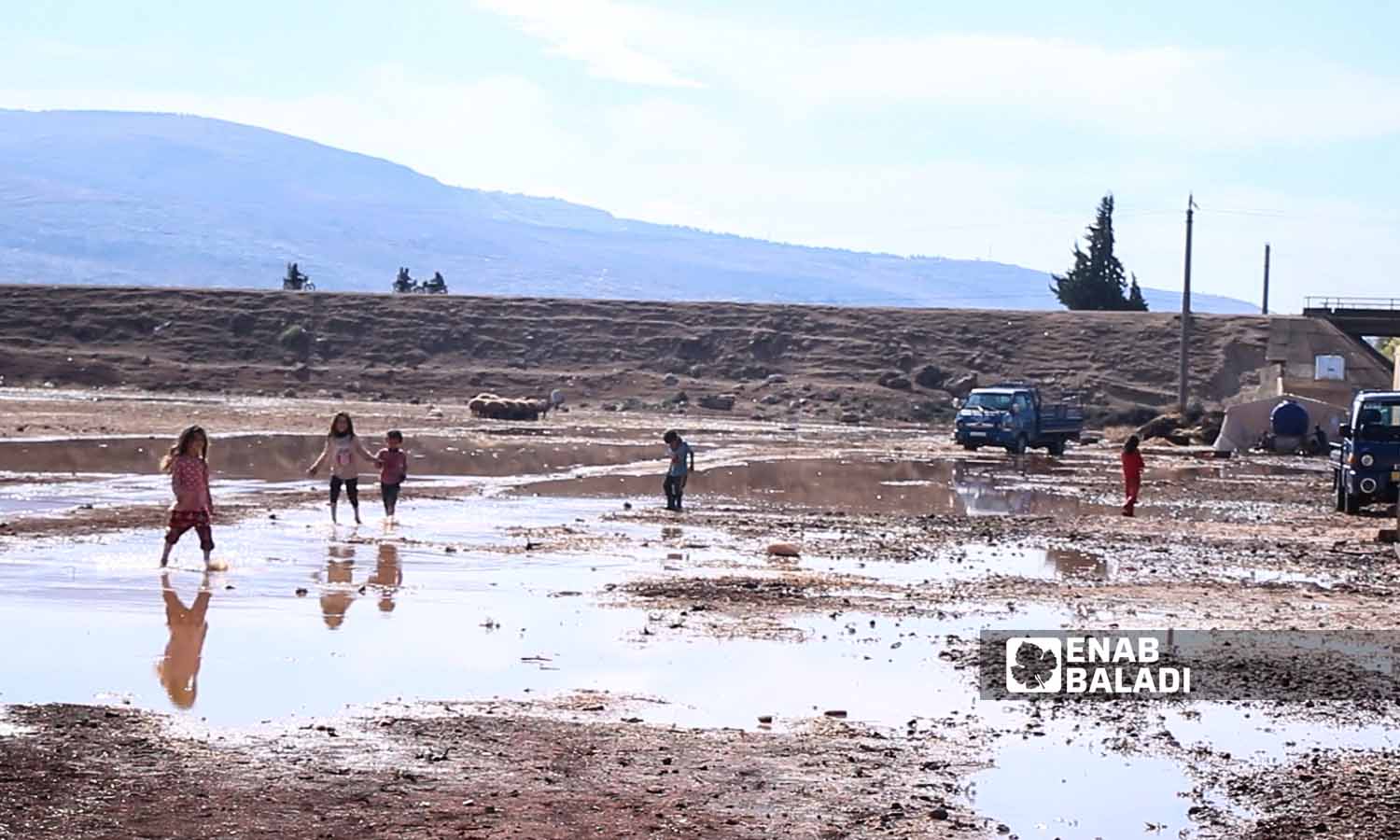



Idlib – Mohammad Nasan Dabel
A heavy rainstorm hit Idlib, announcing the arrival of winter with its hardships and suffering for residents of the northwestern governorate and the IDPs in particular.
The heavy rains caused torrential rains caused by the lack of infrastructure and road drains, which caused damage and blocked roads in a number of IDP camps and villages.
Five camps were damaged in Sahel al-Rouj in the western countryside of Idlib: al-Mahatta, al-Barsa, Talmans, al-Bala’a, and al-Sikka, in addition to Turkman al-Zawiya camp in Jisr al-Shughour countryside, and Wadi Hajj Khaled camp, west of Idlib city.
The number of families affected by the rainstorm is estimated at more than 100 families, where the torrential waters and rain reached more than 130 tents, in addition to partial damage in other camps, the Syria Civil Defense reported on its official website.
The damage extended to most of the towns of Idlib governorate and led to the interruption of a number of roads in the city of Idlib, the roads connecting to it, and others in villages and towns in the western countryside.
The floods caused a car to drift in the village of Sijar, and part of a house was destroyed in the village of Ari, west of Idlib.
Thamer Maho, an IDP of the Sikka camp, told Enab Baladi that “a thunderstorm and a rainstorm led to the water entering the tents,” calling on humanitarian organizations to consider the conditions of the sunken tents, providing rain-insulating materials and equipment for those unaffected by it, repairing the bypass road leading to the highway, and establishing a sewage system to drain the collected water.
During the past winter, rain and snow storms damaged hundreds of camps and displaced tens of thousands of families in the absence of effective solutions to face the weather fluctuations and effects.
A study prepared by the Civil Defense in late 2021, which provided the basic needs of the displaced in 192 camps in northwestern Syria, reviewed the exposure of 81% of the camps to floods and the sinking of tents and that 78% of them suffered from the lack of adequate heating.
69% of the camps suffer from the formation of water swamps and mud as a result of the poor condition of the roads and sidewalks, and 66% of the camps witnessed the rupture and uprooting of tents as a result of strong winds and rain. 40% of the camps faced difficulties resulting from the inability of humanitarian organizations to reach them due to the poor conditions of the roads leading to the camps.
The field study showed that despite the intervention of humanitarian actors within the camps sector, the total of these interventions managed to solve only about 42% of the camps’ problems, while 58% of these difficulties are still ongoing, noting that the unresolved problem was mostly in opening channels to drain rainwater.
This comes amid the absence of permanent solutions and the necessity of humanitarian organizations and Civil Defense volunteers to conduct emergency interventions annually to prevent the occurrence of humanitarian disasters, according to the study.
Mohammad Haj Asaad, a Civil Defense official, told Enab Baladi that the work of the local rescue agency continues permanently in summer and winter with regard to road rehabilitation services inside the camps, water and sanitation services, in addition to prevention and health care services that limit the spread of diseases inside the camps.
One of the most important responses to the winter season is to strengthen the perimeter of the camps to prevent rainwater from reaching them, in addition to opening sewage channels and removing dirt stuck in them to prevent clogging, according to Haj Asaad.
He added that the Civil Defense (White Helmets) teams are currently intensifying environmental sanitation services, including maintaining health conditions by providing waste collection services.
In addition to treating water and reducing pollution factors, especially with the outbreak of cholera, where waste-contaminated areas are a suitable environment for its spread.
Haj Asaad indicated that the service business sector in the Civil Defense constitutes the largest part of its total work, at a rate of up to 70%, and it helps to face the difficult conditions that civilians are going through in the camps and to meet a small part of their needs.
Regarding the formation of torrents in the camps during the last storm, Haj Asaad said that torrential rain floods many tents every year, and the issue of sanitation is not directly related to these torrents, but what is happening is that large amounts of rainfall in record time cause the formation of powerful floods.
He added that servicing the camps with drainage channels, covering their floors, and preparing earth mounds to prevent the arrival of torrential rains, are important steps, but they are “emergency and unsustainable solutions.”
The local official in the “White Helmets” attributed the lack of campaigns, plans, or special projects in the camps to the weak capabilities of organizations working in the humanitarian field, and the weak international support, especially with the presence of 1500 camps inhabited by more than a million and a half people inside cloth camps that do not protect from heat or cold and rain, which is the reason for the recurrence of tragedy in summer and winter.
According to the Syrian Response Coordination Group (SRCG), the claim of organizations operating in the region to implement urgent projects for the camps is “unrealistic” compared to the damage done.
The relief group added that the actual rainfall has not yet begun, and the “early recovery” projects implemented in the camps are unfair compared to what is being implemented in areas controlled by the Syrian regime.
if you think the article contain wrong information or you have additional details Send Correction